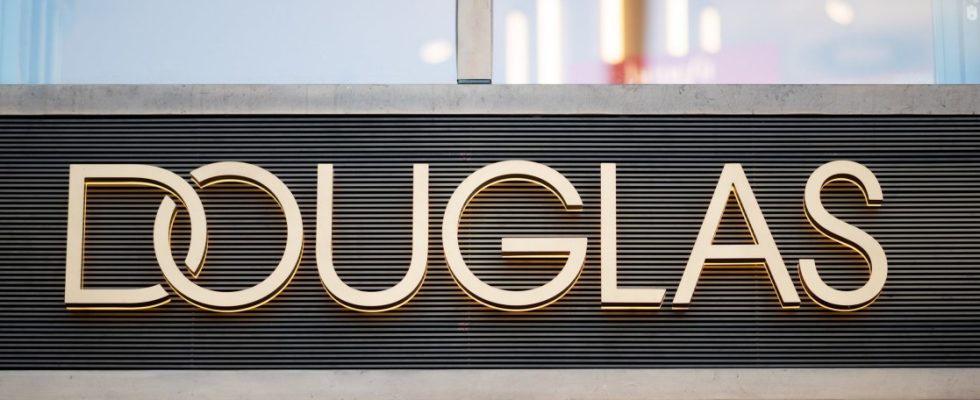It is an IPO that the Douglas perfumery chain has been working towards for years. It was postponed several times. Now the Düsseldorf company has officially announced it. The cosmetics group is scheduled to be listed in the SDax in Frankfurt for smaller companies before Easter. Other retailers are already represented there, such as Ceconomy, Hornbach and Metro.
The timing of the announcement was unclear until the last minute. The question was: Will one or the other investor back out? Does the IPO have to be canceled at short notice, such as that of the Renk defense company? Does the mood on the stock markets remain positive? At the weekend, those involved, especially the owners, gave the starting signal.
The financial investor CVC pushed ahead with the IPO and spent years looking for the right time. CVC holds around 85 percent and the founding Kreke family holds around 15 percent of the shares in the group. Both want to stay invested initially. What is not in the press release about the IPO, but is an open secret: CVC is preparing to exit the investment in the medium term.
In the press release about the IPO, Henning Kreke, Chairman of the Supervisory Board, was quoted as saying: “Our family sees itself as a committed investor and looks forward to continuing to support the Douglas Group in the future.” For Daniel Pindur, Managing Partner of CVC Capital Partners, the wording is slightly different: “We remain committed as a major shareholder and are convinced of the Douglas Group’s great growth potential in the European premium beauty market.” There is no question of a permanent commitment. The plan is now to sell new shares worth 1.1 billion euros.
The financial investor CVC took over Douglas in 2015 for almost three billion euros from the private equity company Advent, which had taken the company off the stock exchange in 2013. CVC reportedly paid too high a price for Douglas.
Alexander Dibelius became CVC Germany boss in 2015. He had taken over the shareholding he had recently made from his predecessor. It didn’t take long before there was public speculation that Douglas would soon return to the stock market and CVC could exit the investment. But going public turned out to be more difficult than expected. That’s Dibelius’ job: buying companies and selling them off at a profit. But something always came up.
Initially, the perfumery chain, which is present in 22 European countries, with its 18,000 employees was not ready to be of interest to investors. Before Corona, the chain was considered dusty, allegedly not fit enough for the modern online world, and had far too many branches. Then the pandemic broke out and retailers had to close their branches, including Douglas. An IPO was out of the question. During the Corona period, Douglas closed around 660 small and unprofitable branches. Finally, the war in Ukraine and, as a result, inflation and a slump in consumption.
The back and forth is also reflected in management. Dibelius first tried Isabelle Parize, she switched Douglas to Discount, but failed because of her management style. Then came the former Opel manager Tina Müller (“reparking in the head”). She refocused the brand on luxury and social media presence with celebrities. Douglas focused on acquiring online companies and bought the Dutch online pharmacy Diaspo, which is now up for sale again two years later. An example of the strategy not working.
At Douglas, salespeople can also become influencers
Sander van der Laan has been trying since the end of 2022. He reorganizes the company, shortens paths and increases the efficiency of processes. Things actually went a little better in the past 2022/23 financial year. After the pandemic, consumers returned to city centers and shopped there again. The branch business increased by 13 percent to 2.7 billion euros in sales. Online sales recovered again with an increase of ten percent to 1.3 billion euros. Although e-commerce was generally declining in Germany, at Douglas it accounted for a third of group sales. According to the press release, Chairman of the Supervisory Board Kreke said: “We are very proud of the development of the Douglas Group in recent years.” Now we want to exploit the potential.
The cosmetics chain specifically targets younger customers on social media. Customers and salespeople can become influencers. The aim is also to guide consumers to the 1,850 branches via social media.
Douglas ended up with sales of a good four billion euros, but only achieved a net result of 16 million euros. That was better than the heavy losses in the previous year, but still only just above zero. In the important Christmas business of 2023, the result even worsened.
But what puts at least as much strain on the company is the high debt. Net debt rose to 3.4 billion euros due to purchases and rentals. Douglas owes its owners more than 900 million euros. Unsurprisingly, the IPO is intended to reduce debt.
The rating agency Fitch warned Douglas in February to reduce its “excessive debt levels”. The agency gave Douglas a grade of B- and therefore sees the investment as “highly speculative” because “there is a significant risk of default.” The rating agency Moody’s gave the creditworthiness the same rating in 2023, but does not see the situation as critically as Fitch.
Around 30 managers who take part in an investment program could benefit from the IPO. Douglas recently converted to a public company in preparation for its IPO.
According to the commercial register, the holding company Kirk Beauty A GmbH has been trading as Douglas AG since February 2nd. At the same time, according to the Food newspaper There are also changes in Luxembourg, where CVC has registered its ownership companies. Apparently the changes were intended to save money on capital gains tax.

